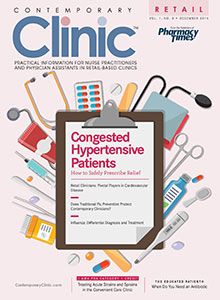From the Editor: Retail Clinics Tackle Acute and Chronic Conditions
With big projections of primary care physician shortages in the United States, more Americans are turning to retail clinics for their health care needs.
With big projections of primary care physician shortages in the United States, more Americans are turning to retail clinics for their health care needs. As the number of retail clinics is speculated to surpass 2800 by 2017, the nurse practitioners and physician assistants who staff these clinics are becoming the first lines of defense, as well as the supporting players, in not only battling acute conditions such as colds, but in some cases also providing chronic disease care for conditions such as hypertension and hyperlipidemia. That is why we are devoting this issue to both an acute illness (cough, cold, and flu) and a chronic disease (heart health).
Articles in this issue provide best practices for the prevention of cardiovascular disease in the retail clinic—from the initial visit where retail-based clinicians may first recognize an issue to support measures that can ensure that these patients get or stay healthy. This issue also includes an educational case study that explores the signs of myocardial infarction that might not be readily apparent. Because a multitude of visitors to retail clinics are already taking some type of heart medication, this issue also highlights important drug-drug interactions between common cough, cold, and flu medications and cardiac drugs.
The majority of retail clinic visits are still related to cough, cold, and flu, and so this issue provides educational articles on differential diagnoses between the flu and other diseases, as well as advice on treating patients with the flu outside of the 48-hour mark. This issue also offers guidance to retail clinicians on how to stay healthy, and there is easy-to-read information for clinicians to educate patients on when they truly need an antibiotic and when they do not.
As retail clinics continue to provide both acute and chronic care,Contemporary Clinicwill continue to provide the latest clinical updates on focused therapeutic areas that relate to patient care in the convenient care setting.
Tine Hansen-Turton serves as the founding executive director for the Convenient Care Association (CCA), the national trade association for the over 2,000 private-sector retail clinics industry, which serves millions of people with basic health care services across the country, and has been coined by Harvard professor Clayton Christensen as a “disruptive health innovation.” She assists CCA with business and programmatic strategy, development, coordination and implementation, as well as with policy development and state and national advocacy.

Knock Out Aches and Pains From Cold
October 30th 2019The symptoms associated with colds, most commonly congestion, coughing, sneezing, and sore throats, are the body's response when a virus exerts its effects on the immune system. Cold symptoms peak at about 1 to 2 days and last 7 to 10 days but can last up to 3 weeks.
COPD: Should a Clinician Treat or Refer?
October 27th 2019The Global Initiative for Chronic Obstructive Lung Disease (GOLD) defines the condition as follows: “COPD is a common, preventable, and treatable disease that is characterized by persistent respiratory symptoms and airflow limitation that is due to airway and/or alveolar abnormalities usually caused by significant exposure to noxious particles or gases.â€
Diabetic Ketoacidosis Is Preventable With Proper Treatment
October 24th 2019Cancer, diabetes, and heart disease account for a large portion of the $3.3 trillion annual US health care expenditures. In fact, 90% of these expenditures are due to chronic conditions. About 23 million people in the United States have diabetes, 7 million have undiagnosed diabetes, and 83 million have prediabetes.
What Are the Latest Influenza Vaccine Recommendations?
October 21st 2019Clinicians should recommend routine yearly influenza vaccinations for everyone 6 months or older who has no contraindications for the 2019-2020 influenza season starting at the end of October, according to the Advisory Committee on Immunization Practices.
What Is the Best Way to Treat Pharyngitis?
October 18th 2019There are many different causes of throat discomfort, but patients commonly associate a sore throat with an infection and may think that they need antibiotics. This unfortunately leads to unnecessary antibiotic prescribing when clinicians do not apply evidence-based practice.





